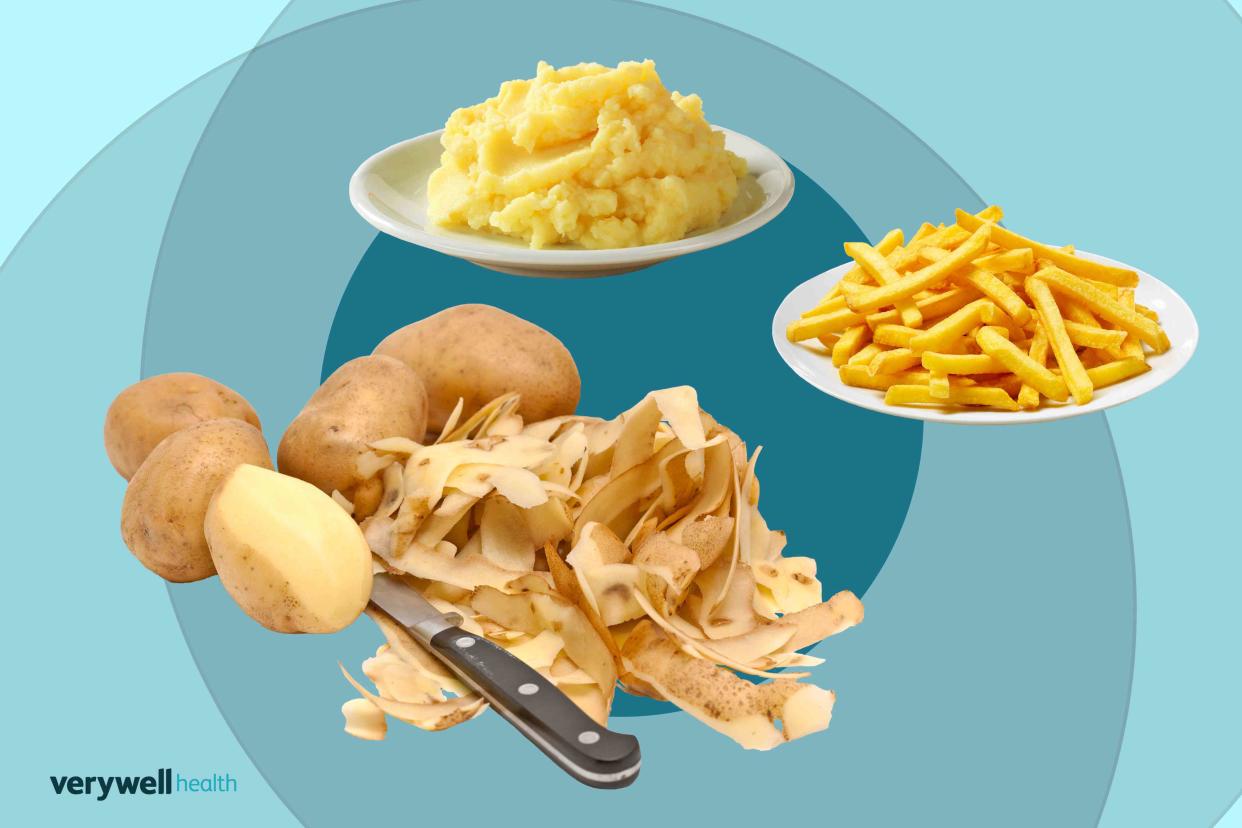Do Potatoes Count as a Vegetable?

Photo Illustration by Lecia Landis for Verywell Health; Getty Images
Fact checked by Nick Blackmer
Key Takeaways
Potatoes don’t count as vegetables in some dietary guidelines.
There’s speculation that potatoes may be reclassified as a grain in the upcoming Dietary Guidelines for Americans 2025–2030.
Unlike green vegetables, potatoes are high in carbohydrates and starches. But they’re also nutrient-dense and virtually fat-free.
Americans eat more potatoes than almost any other vegetable, and these spuds are a good source of potassium and vitamin C.
Only about 10% of U.S. adults eat enough vegetables, but nutrition experts disagree on whether potatoes count toward vegetable intake because they’re high in carbohydrates, which could cause blood sugar spikes.
White potatoes, along with corn, peas, and cassava, fall under the “starchy vegetable” subcategory.
Eating vegetables of all kinds, including starchy vegetables, is a “core element” of a healthy dietary pattern, according to the guidelines. These guidelines are used to develop the USDA’s MyPlate, the modern version of the food pyramid, as well as federal nutrition programs, which have included potatoes as a vegetable in school lunches.
However, there is some speculation that potatoes may be reclassified as a grain in the dietary guideline updates in 2025.
Kam Quarles, CEO of the National Potato Council, said this decision would lead to a “chaotic outcome” when he testified before the Dietary Guidelines Advisory Committee in September.
“Potatoes are classified with other vegetables based on their botanical and horticultural characteristics. Therefore, a decision to incorrectly reclassify them as a grain is technically inaccurate and not grounded in any scientific metric,” Quarles told Verywell in an email.
Related: Sorry TikTok, Putting Potatoes in Your Socks Won't Clear Toxins From Your Body
Are Potatoes a Vegetable or a Grain?
Potatoes don’t have a similar nutrient profile as other vegetables like lettuce, tomatoes, and carrots, but they also don’t match the profile of a grain perfectly, according to Caroline West Passerrello, EdD, RDN, LDN, a registered dietitian based in Pittsburgh.
Unlike green vegetables, potatoes contain starches that can cause a spike in blood sugar levels. The nutrient profile of potatoes resembles whole grains like oats and brown rice. A 100-gram serving of baked potatoes offers similar amounts of protein, fiber, and mineral content as 100 g of cooked brown rice. But starches in whole grains are digested more slowly and, therefore, don’t elevate blood sugar as quickly.
Related: Why Are Carbohydrates Important?
“Potatoes are fairly nutrient-dense and can be served in a variety of ways,” Passerrello told Verywell in an email. “They’re virtually fat-free and contain many vitamins such as B6, C, and potassium. And they can contain dietary fiber, especially if you consume the skin.”
Some public health authorities, such as Harvard T.H. Chan School of Public Health, have already removed potatoes from the vegetable category.
“In comparison to nutrient-dense, high-fiber vegetables, potatoes are high in the kind of carbohydrate that the body digests rapidly, causing blood sugar and insulin to surge and then dip,” said Lilian Cheung, DSc, RD, director of health promotion and communication at the Harvard T.H. Chan School of Public Health’s department of nutrition.
While potatoes do provide dietary fiber, Cheung said, most of it is found in the skin that’s often peeled off before cooking.
Related: What Foods Are High in Fiber? Everything You Need to Know
Harvard’s recommendation to limit potato consumption “was largely based on associations with weight gain and diabetes,” she added.
The World Health Organization (WHO) also excludes potatoes from the vegetable category and the United Kingdom’s Eatwell Guide classifies potatoes as a starchy carbohydrate along with bread, rice, and pasta.
“The bottom line is that just because potatoes are not counted as vegetables on the Healthy Eating Plate, it doesn’t mean they can’t be included within a healthy meal,” Cheung said. “Incorporating potatoes on occasion as part of an overall healthy diet—preferably prepared with the skin intact with minimal added saturated fat—can add enjoyment and satisfaction to a meal.”
Read Next: 8 Fruits and Vegetables That Can Help You Get More Protein
What This Means For You
Potatoes can be included as part of a healthy eating pattern, but preparation is important. Potatoes are a good source of fiber when the skin is left on, but frying potatoes can increase the dish’s fat content.
Read the original article on Verywell Health.

